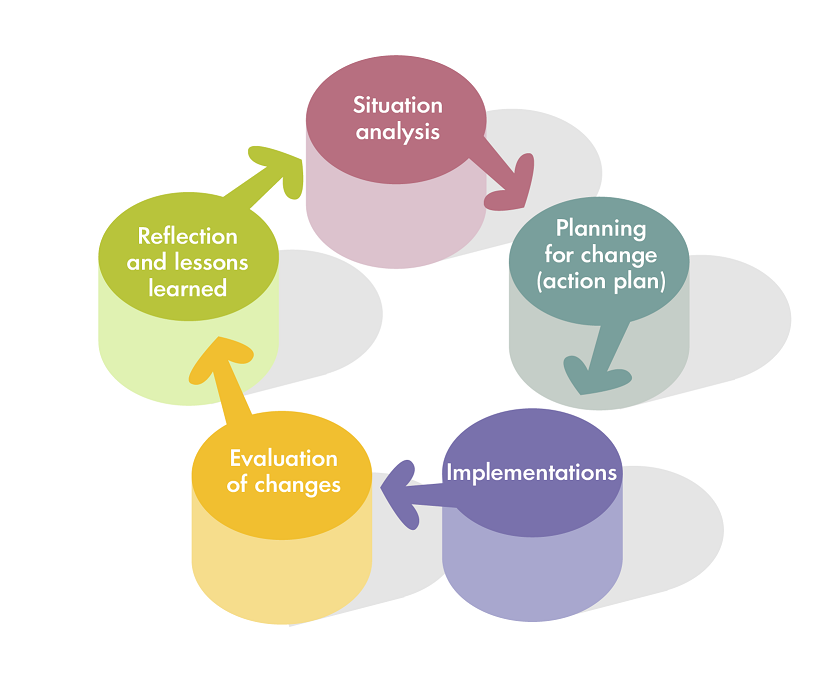Decision-making in democratic school leadership
Living Democracy » Principals » LEADERSHIP » Democratic school leadership as a whole-school approach » Decision-making in democratic school leadership
a) A five-stage model of school development and decision-making processes
Based on Reference Framework of Competences for Democratic Culture, Vol. 3, p. 97 f.
This model outlines five steps that a school can take in a whole-school approach to developing a more democratic school culture and the development of the learners’ competences for democratic culture. It can be adapted to decision-making processes dealing with any challenge and issue (see Action Handout 4.1).

- Conduct a situation analysis to identify how principles of democracy and human rights are integrated into school life, including strengths and weaknesses, and with the participation of all stakeholders (e.g. whole-school assessments, SWOT analysis of Strengths – Weaknesses – Opportunities – Threats).
- Identify potential areas of change and develop an action plan with the concrete activities you will undertake to achieve these changes (e.g. CDC as expected learning outcome).
- Implement the action plan and ensure that it involves the whole school community.
- Evaluate your progress and assess the impact of your work.
- Share lessons learned with all stakeholders involved in your efforts as well as with other schools and plan further action accordingly.
b) A democratic school community is a learning community
There is no single master solution to the challenges faced by your school community, or society as a whole (see Awareness Handout 3.1). In attempting to address these challenges, we develop a cluster of competences for democratic culture (CDC). We acquire and practise these competences (learning by doing), which applies to beginners and experienced players alike.
If no one knows the master solution to a given problem, the members of the school community have to find one together. By adopting a whole- school approach, all members of the school community can contribute their expertise and advocate for their points of view and their interests. The solution may then find wider support. This solution will often work, but may sometimes fail to deliver the expected outcome. In this case, a new cycle of decision-making begins. The diagram shown above reflects this necessity to deal with an issue again by linking evaluation (stage 4) and reflection (stage 5) with a new situation analysis (stage 1). An authoritarian leader would try to conceal his failure, as his prestige as strongman would be severely damaged. A democratic learning community, on the other hand, can draw new strength by learning through failure (see part c below).
The cluster of competences for a democratic culture that are particularly important for problem-solving and decision-making include the following (see Competences for Democratic Culture:
Autonomous learning skills enable a person to acquire new information and critically assess its sources (CDC, p. 44). This is important in dealing with incomplete information by assessing which information is sound and credible, and by discovering and correcting errors.
A tolerant attitude towards ambiguity, includes the “acceptance of complexity, contradictions and lack of clarity” and irrational behavior on all sides, including oneself (CDC p. 43). This enables a person to be patient when wrestling with a problem proves to be difficult and time consuming.
Analytical and critical thinking skills and knowledge and critical understanding of the world (CDC, pp. 44 ff., 52 ff.) in dealing with complexity and contingency. These may not only be rooted in a given problem, but paradoxically also in a pluralist community with a high level of democratic participation. People who lack this skill may lean to “the authoritarian temptation”.

Knowledge and critical understanding of how democratic institutions work (CDC, p. 52) enables members of the school community to understand the institutional framework and their rights of participation at their school (see Preparation Handout 3.1). In particular, they need to understand the limits and opportunities that their school’s institutional framework provides (see Democratic governance of schools, p. 33 f).
c) Evaluation and reflection – the key to sustainable school development
In the five-stage model of decision-making, stages 4 (evaluation) and 5 (reflection) are essential for school development and success in several respects.
Learning by thinking about what we are doing: All competences, including those for democratic culture are acquired through practice, which is learning by doing. Learning by doing, however, does not necessarily include a clear understanding of the learning experience. It is through reflection that learners – not only students, but all members of the school community – become aware of the competences that they have newly acquired or practised, and integrate them in their mental toolbox, as it were, ready to be deployed in the future.
The assessment of outcomes renders future decision-making processes more efficient. Outcome assessments enable stakeholders to identify weaknesses and errors and to understand the reasons for success. We need to focus on questions such as the following:
- Was the situation analysis (stage 1) correct? Did we have the information we needed?
- Has our action plan (stage 2) and its implementation (stage 3) solved our problem?
- Are the outcomes fair, or at least acceptable for all groups in our school community?
- Do we agree in our assessment?
- …
Feedback on participation and learning experiences focuses on the decision-making process, the opportunities to participate, and reflects on what has been learned by doing. This is important for all stakeholders in the school community – the teachers, parents and students.
- Who brought the issue to our attention? – Who was the agenda-setter?
- Are you personally satisfied with your opportunities to participate?
- Do you believe that everyone had a fair chance to participate and express their views?
- What have you learned?
- What would you like to learn?
- How was your experience with democratic school culture?
- …


